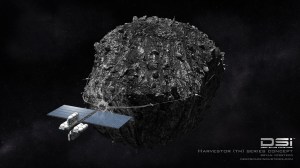Today, the Luxembourg Government announced that they are taking steps to become Europe’s hub for mining space resources.
The small European country plans to establish the necessary legal and regulatory framework and invest in related research and development projects. They’re even considering investing in already-established asteroid mining companies like the U.S. based Deep Space Industries and Planetary Resources.
This announcement comes shortly after the United States took a huge step forward in making commercial space mining legal. President Obama signed the U.S. Commercial Space Launch Competitiveness Act (CSLCA) in November, which stated that U.S. companies are entitled to maintain property rights of resources they’ve obtained from outer space.

The Luxembourg initiative will be advised by Jean-Jacques Dordain, the former Director General of the European Space Agency. In a press conference today, Dordain said, “This initiative is a clear demonstration that Europeans are innovative and able to take risks when the stakes are high. While futuristic, the project is based on solid grounds, i.e. technical prowess that already exists in Europe and around the world.”
Mining resources from space isn’t the first initiative the country, with a population of just over half a million people, has pursued in the space industry. SES, a company that owns and operates over 50 geostationary satellites, is also based in Luxembourg.
Regulatory Peace of Mind
Mining resources in space is not an easy – or cheap – business. CSLCA gave space mining companies peace of mind that they will be able to maintain property rights to resources they extract.
CSLCA explicitly outlined private sector rights which were only implicitly stated in the 1967 Outer Space Treaty, the prevailing international law on these matters. Now that CSLCA has been passed in the U.S., it reduces regulatory risk for domestic companies investing millions of dollars into the technology required to properly mine space resources.
With today’s announcement Luxembourg is on its way to become the second country to lay the groundwork required to make space mining a reality.
The Value of Space Resources
Established space mining companies today are generally interested in two destinations: asteroids and the moon. The companies that Luxembourg has stated an interest in, Planetary Resources and Deep Space Industries, have focused their attention on asteroids.
The website Asterank maintains a list of known asteroids in the solar system. Based on an asteroid’s composition and today’s current market prices for metals and minerals, it determines an asteroid’s current value. Some of the asteroids in Asterank’s database are worth more than $100 trillion.
That is an unthinkably high value for the market of asteroid mining. But before you get too excited, there are other factors to consider.
Asteroids included on this list have different orbits, spin rates and orbital speeds. Some are too far out, spin too quickly about their axis, or are moving too fast in their orbit to reasonably select as a mining destination.
Ultimately, only a portion of these asteroids will be worth a company’s time.
Today, Deep Space Industries and Planetary Resources are working to identify the best asteroid candidates. Both companies are building small spacecraft that will be used to prospect promising asteroids.
After the prospecting work is completed, these companies will need to conquer the next difficult task: determining a cost-effective extraction strategy.
There are a few different options for asteroid mining companies. A company could harvest an asteroid for water which can be broken into hydrogen and oxygen and used to create rocket propellant. This would essentially transform asteroids into gas stations where traveling spacecraft could stop and refuel, extending their mission lifetime.
Alternatively, companies may extract raw material from an asteroid and then bring this material back to sell on Earth.
Regarding this second strategy, many are quick to question the value of the asteroids in Asterank’s database. Critics cite the important factor that if you add a large amount of a rare resource to the market, that resource no longer rare and will decrease in value. Some of the asteroids are calculated to be worth $100 trillion simply because they’re rich with resources that are limited here on Earth.
However, the situation is more complicated than that. If one asteroid mining company owns the majority of the supply, they can hold great influence over the value of that material.
Consider the diamond industry where, for over 80 years, De Beers held an international monopoly. During their monopolistic reign, the company was able to strongly control the price of diamonds by influencing the supply in the market.
It’s possible that one of these asteroid mining companies could do the same with various space-based resources.
A Problem Worth Tackling
There are many expensive steps that will be required for any company to successfully make money from asteroid resources. However, providing the necessary legal framework is an important first step in order to encourage innovation and investment in this area.
When asked whether they saw this as a competition with Planetary Resources, Deep Space Industries told TechCrunch, “We don’t look at it as ‘competing’ with PRI, as much as working together to build a viable long-term industry. At this stage of the game, what benefits one of us, benefits all of us.”
To date, there have only been two successful robotic sample return missions from planetary bodies in our solar system. Comet dust particles were collected in NASA’s Stardust mission, and microscopic asteroid particles were collected from the Japan Aerospace Exploration Agency’s Hayabusa probe.
Sample return missions, even those that are only capable of bringing back microscopic particles, are very expensive. NASA’s Stardust mission, for example, was nearly $200 million.
Determining a cost effective way to bring back exponentially more material will be a challenge for the asteroid mining industry.
But with the value of asteroids potentially in the trillions of dollars, it’s a problem worth tackling. Having more countries join the United States and Luxembourg and contribute to research and development will help the private industry work on these problems faster.
Deep Space Industries told TechCrunch, “the country’s willingness to help support research and development in this area could be very beneficial to increasing the pace of the industry’s progress.”






























Comment